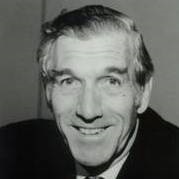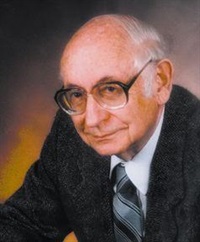EP85 Panel 07 - Psychotherapy and Social Issues - Ronald D. Laing, MD; Judd Marmor, MD; Paul Watzlawick, PhD; Joseph Wolpe, MD
- Average Rating:
- Not yet rated
- Topic Areas:
- Topical Panels | Psychotherapy | Communication | Cultural and Social Contexts
- Categories:
- Evolution of Psychotherapy | Evolution of Psychotherapy 1985 | Pioneers in Couples and Family Therapy
- Faculty:
- Ronald Laing, MD | Judd Marmor | Paul Watzlawick, PhD | Joseph Wolpe, M.D.
- Course Levels:
- Master Degree or Higher in Health-Related Field
- Duration:
- 54:44
- Format:
- Audio and Video
- Original Program Date:
- Dec 12, 1985
- License:
- Never Expires.
Description
Description: This panel looks at how psychotherapy is shaped by the world around it. Laing questions mandatory reporting laws and their effects on trust in the therapy room. Marmor reflects on the cultural and historical forces that influence practice. Wolpe makes a case for brief, evidence-based work, while Watzlawick warns against therapists taking on too much authority. The group takes on big questions—from the ethics of sexual reorientation therapy to the therapist’s role in social justice and global conflict.
Moderated by Aaron H Canter, PhD.
Educational Objectives:
- To compare and contrast clinical and philosophical perspectives of experts.
*Sessions may be edited for content and to preserve confidentiality*
Credits
Faculty

Ronald Laing, MD Related Seminars and Products
Ronald David Laing, usually cited as R. D. Laing, was a Scottish psychiatrist who wrote extensively on mental illness – in particular, the experience of psychosis. R.D. received his M.D. from Glasgow University. Laing's name comes to mind when one thinks of practitioners who have been most effective at challenging prevailing medical thinking on schizophrenia. He has practices psychotherapy for more than 35 years and has authored 11 volumes.
Laing teaches and practices in London. Formerly he served as Chairman of The Philadelphia Association; was associated with the Tavistock Clinic; and was a Fellow of The Foundations Fund for Research in Psychiatry.

Judd Marmor Related Seminars and Products
Judd Marmor, MD, was an American psychiatrist known for his role in removing homosexuality from the American Psychiatric Association Diagnostic and Statistical Manual of Mental Disorders. Judd was an adjunct Professor of Psychiatry at the University of California in LA, was Franz Alexander Professor of Psychiatry at the University of Southern California School of Medicine. he has practices medicine for more than 50 years, having graduated from Columbia University College of Physicians and Surgeons in 1933. He is past president of the American Psychiatric Association, American Academy of Psychoanalysis, and The Group for the Advancement of Psychoanalysis, and The Group for the Advancement of Psychiatry. He is recipient of the Bowis Award for Outstanding Achievements in Leadership in the Field of Psychiatry from the American College of Psychiatrists and the Founders Award from the American Psychiatric Association. Dr. Marmor served on the editorial board of 14 journals.He authored five books and co-authored one. He has written or co-written more than 300 scientific papers. Much of his writing has been on psychoanalysis and human sexuality.

Paul Watzlawick, PhD Related Seminars and Products
Paul Watzlawick, received his Ph.D. from the University of Venice in 1949. He has an Analyst's Diploma from the C.G. Jung Institute for Analytic Psychology in Zurich. Watzlawick has practiced psychotherapy for more than 30 years. He was research associate and principal investigator at the Mental Research Institute. He was Clinical Professor at the Department of Psychiatry and Behavioral Sciences, Stanford University Medical Center. Watzlawick is a noted family therapist; he is recipient of the Distinguished Achievement Award from the American Family Therapy Association. Also, he is author, co-author or editor of eight books on the topics of interactional psychotherapy, human communication and constructivist philosophy.
He formulated five axioms. They are:
- It is not possible to not communicate. Every behavior is some kind of non-verbal communication.
- Every communication has a content. In addition, there is 'metainformation', which says how the communicator wants to be understood.
- All partners involved in a communication process also interpret their own behaviour during communication.
- Human communication involves both verbal and non-verbal communication. In addition to the spoken words, there are is also a non-spoken part (gestures, behavior, intonation..) which is part of the communication.
- Communication between humans is either symmetric or complementary. This is based on whether the relationship of those communicating is based on differences or parity.

Joseph Wolpe, M.D. Related Seminars and Products
Joseph Wolpe, MD, was a South African psychiatrist, one of the most influential figures in Behavior Therapy. Wolpe grew up in South Africa, attending Parktown Boys' High School. Joseph received his M.D. in 1948 from the University of Whitatersrand in Johannesburg, South Africa. He was Emeritus Professor fo Psychiatry and Former Director of Behavior Therapy Unity at Temple University Medical School. He was Professor of Psychiatry at the Medical College of Pennsylvania. One of the leading practitioners of behavior therapy, he has authored three books and co-edited two, and has more than 200 professional publications. He cofounded the Journal of Behavior Therapy and Experimental Psychiatry. He is receipient of the Distinguished Scientific Award for the Applications of Psychology from the American Psychological Association.


